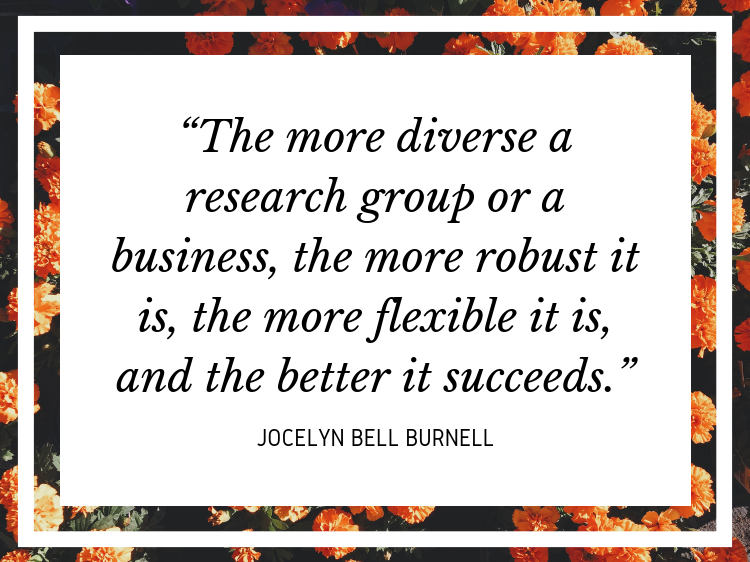Unconventional Mentor no. 21 - Jocelyn Bell Burnell
“The more diverse a research group or a business, the more robust it is, the more flexible it is, and the better it succeeds.”
Quote “The more diverse a research group or a business, the more robust it is, the more flexible it is, and the better it succeeds.” - Jocelyn Bell Burnell
Jocelyn Bell Burnell is an incredibly inspiring woman. Not only did she make her career in a very male dominated field, but when she missed out on a Nobel Prize (her discovery of the first radio pulsars was written up as a paper by her supervisor and an astronomer, and they got the credit) she refused to speak out against the Nobel Prize decision and instead noted that it was very rare for research students to be awarded the prize. In 2018 she won Special Breakthrough Prize in Fundamental Physics which has a £2.3 million prize, which she has given to The Institute of Physics to set up a fund for underrepresented students in the field.
“If you get a Nobel prize you have this fantastic week and then nobody gives you anything else. If you don’t get a Nobel prize you get everything that moves. Almost every year there’s been some sort of party because I’ve got another award. That’s much more fun.”
I absolutely love the attitude that Jocelyn has taken to missing out on a Nobel Prize. This quote shows that she sees it very much as a positive thing. That despite it seeming to be one of the most prestigious prizes, her career and recognition has actually been better for not having won it.
I’ve read several interviews with Jocelyn to write this piece and what comes across is how humble she is about her discovery and how excited she gets about her work. Her discovery of pulsars in the 1960s was revolutionary and it has been the foundation of a whole new area of astrophysics and yet she speaks about it in a very humble way. She also talks a lot about her insecurities and the things that have held her back with openness. Her words are always so positive, and she is quite softly spoken, yet at the same time her words can be quite cutting and critical about the state of diversity and representation in her field.
“Throughout my working life, I've been either one of very few women or the most senior woman in the place.”
The 1960s was a very challenging time to be a female scientist. Jocelyn talks about the press of the day not knowing what to make of her. “It was clear they didn't know how to handle a young woman scientist. Photographers would say, "Could you undo some buttons on your jacket, please?" Journalists asked how many boyfriends I had.” She also talks about having to take time out of her career to have a child and the impact that part time working has had on her career.
As a women now in her 70s, I love that Jocelyn is speaking out about being a woman in the world of physics and continuing to tell her story. She is paving the way for a more diverse workforce and the possibility to make discoveries as revolutionary as her own.
Mentor Advice: Look for the opportunity in a disappointing situation
The advice that I take from Jocelyn Bell Burnell is to look for the opportunity in situations which don’t seem to have gone your way. It must have been a huge disappointment to have made such a breakthrough discovery only to have the credit for that discovery go to someone else. Jocelyn didn’t let that stop her doing more work in her field and she has gone on to have an incredible career in astrophysics. Career highlights include becoming the first female president of the Institute of Physics and the Royal Society of Edinburgh as well as numerous teaching positions and awards. Perhaps because of her experience with the Nobel Prize, or just being a woman working in a male dominated field, she has always worked to make physics accessible to people who are underrepresented in the field, supporting the Athena SWAN programme and donating her recent prize money to support a new wave of students.
When you have an idea of how you want a project at work or you career path to go, it can be disappointing and demoralising not to succeed, particularly if someone else has taken credit for your work. If you can look for the opportunity in disappointment, then you will direct the energy and passion you have for your work into trying again, trying something different, rather than feeling frustrated and disheartened.
You can find out more about Jocelyn Bell Burnell and her work here.
